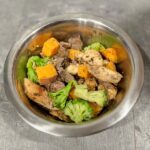If your dog has been diagnosed with Cushing's Disease, you're probably feeling very scared and overwhelmed. There is a lot of information online, in books and coming at you from your veterinarian. No doubt, homemade dog food for Cushing's Disease has crossed your mind.
The first thing you need to do is understand the disease. Cushing's Disease results from excessive production of cortisol in the body. It is most often caused by a tumor forming on the pituitary or adrenal glands.
Cortisol's job is to assist the body in responding to stress. It also keeps the immune system healthy by regulating the metabolism.
There are three types of Cushing's Disease, all of which have different causes:
- Pituitary-Dependent Hyperadrenocorticism (PDH) or Pituitary dependent Cushing's Disease
- Adrenal-Dependent Hyperadrenocorticism (ADH) or Adrenal-dependent Cushing's Disease
- Iatrogenic Hyperadrenocorticism (IHAC) or Iatrogenic Cushing's Disease.
Cushing's Disease is most often seen in older dogs. Symptoms of Cushing's Disease in dogs include:
- excessive or constant panting
- increased appetite
- potbelly appearance
- extreme unquenchable thirst
- the slow hair growth or hair loss
- skin infections
- frequent urination
- has thinning skin
- weak and inactive
In some cases, the tumor can be removed. In other cases, the disease may not be curable. Your veterinarian will discuss treatment options, and a diet for dogs with Cushing's Disease will surely be recommended.
Homemade Dog Food for Cushing’s Disease

Some dog breeds have a genetic predisposition to Cushing's Disease. These breeds include:
- Poodles (especially Miniature Poodles)
- Boxers
- Yorkshire Terriers
- Beagles
- Scottish Terriers
- Dachshunds
- German Shepherds
- Labradors
- Boston Terriers
- Staffordshire Terriers
Dietary changes are one of the necessary treatments for Cushing's Disease in Dogs. Serving a homemade dog food for Cushing's Disease, when formulated properly, is the healthiest option.
Whole food ingredients are easier for your dog to digest. Cutting out the processed and artificial ingredients in many commercial pets foods is essential for treating Cushing's Disease in dogs.
It's also beneficial to serve smaller meals every few hours instead of one or two large meals each day.
If you choose to switch to a homemade dog food like this one, be sure to consult your veterinarian or a canine nutritionist before making the change. You need to ensure that the meals are not only going to be suitable for a dog with Cushing's Disease, but will also be nutritionally balanced to meet all of your dog's needs.
PrintRecipe: Homemade Dog Food for Cushing’s Disease
Most experts recommend a diet high in protein and low in fat. Depending on the type of Cushing's Disease that your dog has, he may also need a diet low in carbohydrates, calcium and fiber.
This is why it's imperative to work with an expert. They will evaluate your dog based on many factors including his weight, breed, age, activity level, as well as the type and stage of Cushing's Disease that he has.
The expert you work with will give you recommendations for meals that will meet all of your pet's needs – not just cater to his health condition.
While this homemade dog food may be right for your pup, your vet may also recommend adding supplements or a multi-vitamin. They could also recommend ingredient substitutions.
- Prep Time: 10 minutes
- Cook Time: 20 minutes
- Total Time: 30 minutes
- Yield: about 10 cups of food 1x
- Category: Cooked Food
- Method: Stovetop
- Cuisine: Dog Food
Ingredients
- 1 lb. chicken (cubed)
- ¾ pound beef liver (cubed)
- 2 cups broccoli (chopped)
- 1 cup sweet potato (chopped)
- ½ cup dry brown rice
Instructions
Prepare the rice according to the instructions on the packaging. Boil the sweet potato and broccoli.
Grill, bake or fry the chicken and beef liver, but be sure not to add any butter or additional fat while cooking.
Once all of the ingredients have been prepared, mix them together in a large bowl. When the dog food has cooled, you can feed it to your pooch.
Nutrition
- Serving Size: 1/2 cup
- Calories: 40
- Sugar: .5 g
- Sodium: 11 mg
- Fat: .5 g
- Carbohydrates: 5.7 g
- Fiber: .6 g
- Protein: 3.2 g
- Cholesterol: 18 mg
Serving Size Recommendation: You can serve this homemade dog food for Cushing's Disease to your pet as soon as it has cooled. I recommend feeding about 1/2 cup of food for every 20-25 pounds of body weight.
This recommendation is for 2 servings per day. So, a 25-pound dog would eat about 1/2 cup in the morning and 1/2 cup in the evening.
This is just a guideline. Some dogs, like working dogs and very active breeds, will need more calories than this. Lazier pets and senior dogs may not need as many.
It's best to consult your veterinarian about the appropriate serving size for you dog. They will also help you evaluate meal to make sure it will meet your pet's unique nutritional needs. If necessary, they will assist you in choosing the best supplements and/or multivitamins to add.
How to store: You can store the leftover Cushing's Disease dog food in an airtight container in the refrigerator for 3-5 days or freeze them, and they’ll keep for up to 3 months. Keep in mind that this recipe includes no preservatives, so that it won't last nearly as long as commercial dog food.
For More Information
We publish many homemade dog food and treat recipes every month. For more recipes, pet food cooking tips, and advice, see our “Recipes” section.If you're new to home-cooked dog food subject, I recommend you read more about “How Much To Feed” to understand serving sizes, “What Supplements To Use” to create well-balanced meals, and “How To Store” for tips on simple and easy homemade dog food storing in a fridge or a freezer.













